2015年厦门大学翻译硕士MTI考研真题答案及复习攻略
【免费下载】厦门大学研究生入学考试历年真题及答案
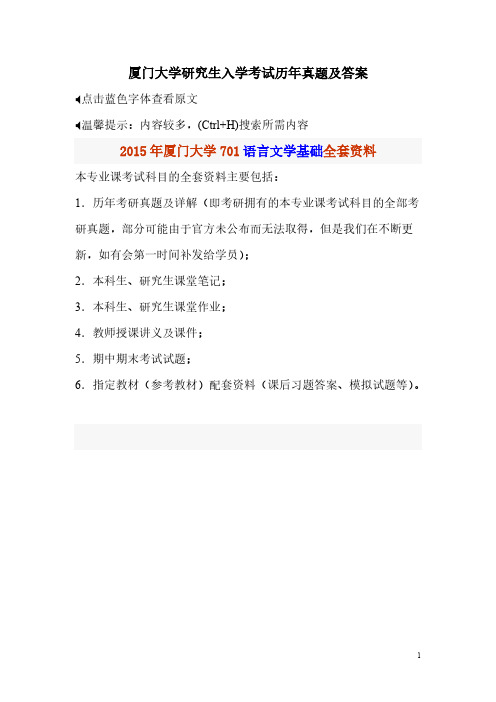
厦门大学研究生入学考试历年真题及答案点击蓝色字体查看原文温馨提示:内容较多,(Ctrl+H)搜索所需内容2015年厦门大学701语言文学基础全套资料本专业课考试科目的全套资料主要包括:1.历年考研真题及详解(即考研拥有的本专业课考试科目的全部考研真题,部分可能由于官方未公布而无法取得,但是我们在不断更新,如有会第一时间补发给学员);2.本科生、研究生课堂笔记;3.本科生、研究生课堂作业;4.教师授课讲义及课件;5.期中期末考试试题;6.指定教材(参考教材)配套资料(课后习题答案、模拟试题等)。
2015年厦门大学802文学理论与文学评论写作全套资料本专业课考试科目的全套资料主要包括:1.历年考研真题及详解(即考研拥有的本专业课考试科目的全部考研真题,部分可能由于官方未公布而无法取得,但是我们在不断更新,如有会第一时间补发给学员);2.本科生、研究生课堂笔记;3.本科生、研究生课堂作业;4.教师授课讲义及课件;5.期中期末考试试题;6.指定教材(参考教材)配套资料(课后习题答案、模拟试题等)。
2015年厦门大学861语言学全套资料本专业课考试科目的全套资料主要包括:1.历年考研真题及详解(即考研拥有的本专业课考试科目的全部考研真题,部分可能由于官方未公布而无法取得,但是我们在不断更新,如有会第一时间补发给学员);2.本科生、研究生课堂笔记;3.本科生、研究生课堂作业;4.教师授课讲义及课件;5.期中期末考试试题;6.指定教材(参考教材)配套资料(课后习题答案、模拟试题等)。
2015年厦门大学313历史学基础全套资料本专业课考试科目的全套资料主要包括:1.历年考研真题及详解(即考研拥有的本专业课考试科目的全部考研真题,部分可能由于官方未公布而无法取得,但是我们在不断更新,如有会第一时间补发给学员);2.本科生、研究生课堂笔记;3.本科生、研究生课堂作业;4.教师授课讲义及课件;5.期中期末考试试题;6.指定教材(参考教材)配套资料(课后习题答案、模拟试题等)。
历年厦门大学211翻译硕士英语考研真题试卷与答案
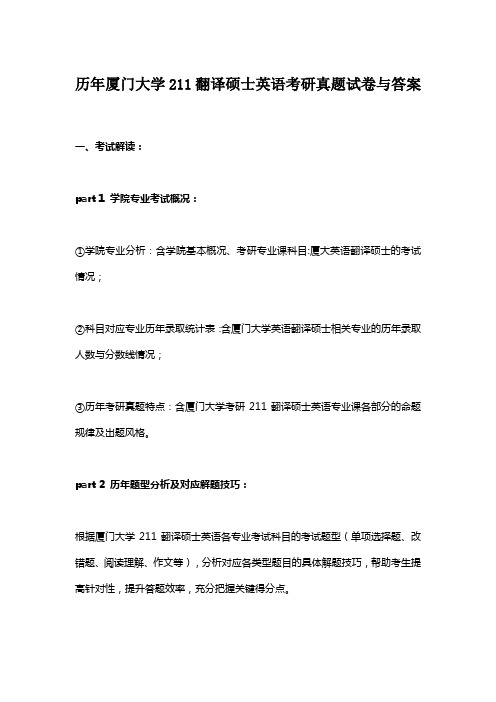
历年厦门大学211翻译硕士英语考研真题试卷与答案一、考试解读:part 1 学院专业考试概况:①学院专业分析:含学院基本概况、考研专业课科目:厦大英语翻译硕士的考试情况;②科目对应专业历年录取统计表:含厦门大学英语翻译硕士相关专业的历年录取人数与分数线情况;③历年考研真题特点:含厦门大学考研211翻译硕士英语专业课各部分的命题规律及出题风格。
part 2 历年题型分析及对应解题技巧:根据厦门大学211翻译硕士英语各专业考试科目的考试题型(单项选择题、改错题、阅读理解、作文等),分析对应各类型题目的具体解题技巧,帮助考生提高针对性,提升答题效率,充分把握关键得分点。
part 3 2018真题分析:最新真题是厦门大学考研中最为珍贵的参考资料,针对最新一年的厦门大学考研真题试卷展开深入剖析,帮助考生有的放矢,把握真题所考察的最新动向与考试侧重点,以便做好更具针对性的复习准备工作。
part 4 2020考试展望:根据上述相关知识点及真题试卷的针对性分析,提高2020考生的备考与应试前瞻性,令考生心中有数,直抵厦门大学考研的核心要旨。
part 5 厦门大学考试大纲:①复习教材罗列(官方指定或重点推荐+拓展书目):不放过任何一个课内、课外知识点。
②官方指定或重点教材的大纲解读:官方没有考试大纲,高分学长学姐为你详细梳理。
③拓展书目说明及复习策略:专业课高分,需要的不仅是参透指定教材的基本功,还应加强课外延展与提升。
part 6 专业课高分备考策略:①考研前期的准备;②复习备考期间的准备与注意事项;③考场注意事项。
part 7 章节考点分布表:罗列厦门大学英语翻硕专业的专业课试卷中,近年试卷考点分布的具体情况,方便考生知晓厦门大学考研专业课试卷的侧重点与知识点分布,有助于考生更具针对性地复习、强化,快准狠地把握高分阵地!二、厦门大学历年考研真题与答案详解:2018年厦门大学211翻译硕士英语考研真题(部分不完整,回忆版)2017年厦门大学211翻译硕士英语考研真题(回忆版)2016年厦门大学211翻译硕士英语考研真题(回忆版)2015年厦门大学211翻译硕士英语考研真题(回忆版)2014年厦门大学211翻译硕士英语考研真题及详解2013年厦门大学211翻译硕士英语考研真题及详解2012年厦门大学211翻译硕士英语考研真题及详解2011年厦门大学211翻译硕士英语考研真题及详解2010年厦门大学211翻译硕士英语考研真题及详解真题试卷和答案摘自群贤厦大考研网。
2015年考研真题及答案专题
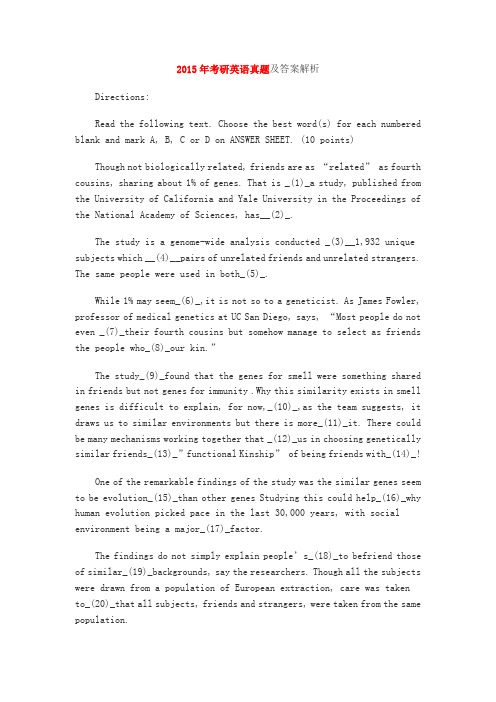
2015年考研英语真题及答案解析Directions:Read the following text. Choose the best word(s) for each numbered blank and mark A, B, C or D on ANSWER SHEET. (10 points)Though not biologically related, friends are as “related” as fourth cousins, sharing about 1% of genes. That is _(1)_a study, published from the University of California and Yale University in the Proceedings of the National Academy of Sciences, has__(2)_.The study is a genome-wide analysis conducted _(3)__1,932 unique subjects which __(4)__pairs of unrelated friends and unrelated strangers. The same people were used in both_(5)_.While 1% may seem_(6)_,it is not so to a geneticist. As James Fowler, professor of medical genetics at UC San Diego, says, “Most people do not even _(7)_their fourth cousins but somehow manage to select as friends the people who_(8)_our kin.”The study_(9)_found that the genes for smell were something shared in friends but not genes for immunity .Why this similarity exists in smell genes is difficult to explain, for now,_(10)_,as the team suggests, it draws us to similar environments but there is more_(11)_it. There could be many mechanisms working together that _(12)_us in choosing genetically similar friends_(13)_”functional Kinship” of being friends with_(14)_!One of the remarkable findings of the study was the similar genes seem to be evolution_(15)_than other genes Studying this could help_(16)_why human evolution picked pace in the last 30,000 years, with social environment being a major_(17)_factor.The findings do not simply explain people’s_(18)_to befriend those of similar_(19)_backgrounds, say the researchers. Though all the subjects were drawn from a population of European extraction, care was takento_(20)_that all subjects, friends and strangers, were taken from the same population.1. [A] when [B] why [C] how [D] what【答案】[D] what【解析】该题考查的是语法知识。
厦门大学翻译硕士考研英语测试题目回忆录

跨考独家整理最全翻硕考研知识资料库,您可以在这里查阅历年翻译硕士考研真题和知识点等内容,加入我们的翻硕考研交流群还可以获得翻硕学长免费答疑服务,帮你度过最艰难的考研年。
以下内容为跨考网整理,如您还需更多考研资料,可选择翻硕考研一对一咨询进行解答。
【厦门大学】百科:一、选择1、东罗马帝国首都2、色即是空,空即是色出自哪部佛经3、轴心时代4、第一次人类环球航行是谁5、最古老的文字6、汉字的六书7、奠定欧洲文明的文明是什么8、四书五经9、三权分立指的是什么10、西方音乐史上都有哪些音乐流派二、应用文电力公司修电路踩坏农民朋友菜地,农民朋友没有责怪,还给予很多帮组,写一份感谢信。
三、命题作文互联网时代,手写信息逐渐变少,谈谈你的看法翻译硕士英语:一、英译汉单词句子翻译,好多都是选自英汉翻译教程》(厦门大学杨士焯,所以,参考书一定要看。
15分1. The houses were built of dry stone with stone slabs for furniture, all very well preserved. 房子是由无浆砌成的石墙建成,以石板为家居,一切保存完好。
2. Other media closer to the scene dismissed Carter as a poor loser. 对此事了解的其他媒体认为,卡特是以个输不起的人/输了就发脾气的人。
3. He is always politically incorrect. 他讲话总是不合时宜。
4. That was not a very happy remark. 那不是很恰当的话。
5. Enjoy the luxury of doing good. 以行善为乐。
6. A. His speech was reported at length in the newspaper. 他的演讲在报纸上详细的刊登出来了。
7. I remembered mailing the letter.我记得寄了信。
厦门大学翻译硕士专业课复习建议

厦门大学翻译硕士专业课复习建议英语翻译基础因此凯程老师会在复习阶段让考生多做真题,认真做好笔记。
真题可以解决考研翻译中的单词问题、句子结构问题、翻译考点问题;笔记可以将参考书由厚变薄,加快复习进度。
下面强调一下翻译真题的使用方法:(1)模拟考试,写出译文在这方面,凯程老师会让学生多多练习翻译实践。
之所以要“写出译文”,是因为我们是在“做”翻译,不是“看”翻译。
很多学习英语的人都有这样的经验:明明自己把句子看懂了,也大概理解英语原文,可是就是表达不出来,经常是“只可意会,不可言传”。
问题就在于翻译实践的练习不够,“做”得不够。
(2)精雕细琢,自我提高凯程老师会对学生翻译过来的译文进行指导,学生也可以从中学习到如何把文章翻译的更通顺。
首先,要完全理解原文,对原文中不懂的单词,需要翻翻词典,如果这个单词是大纲单词,但是你没有掌握的话,就需要把这个单词记录下来,以备后面自己作为基础来掌握。
第二要对原文句子逻辑和语法结构,需要完全把握。
要记住翻译的原则:让句子更通顺,切不要改变原文的意义。
(3)比对答案,查找问题凯程老师总结了一下翻译中的关键问题,基本上就是以下三个:1、单词的意思没有掌握,英语原文的词组没有掌握;2、对原文的逻辑结构和语法结构把握错了,弄错了修饰关系;3、汉语意思表达的时候不太符合汉语语言习惯。
翻译硕士英语这个科目的两大学习任务是在广度和深度上提高英语词汇的学习;加大对文章主旨和背景知识的了解和文章写作意图的理解力;加强对近义词和反义词的区分和学习。
高级英语要十分重视写作能力和阅读理解能力的提高,在这两个方面,凯程老师会对同学们进行系统完善的训练。
(1)单词记忆。
完成易混超难词汇、词汇前后缀、熟词生义、同义词近义词辨析、短语等的记忆,在比较中进行记忆,对单词深化记忆。
(2)阅读理解。
阅读专项训练一定要按时按质完成,凯程老师也会对此进行监督。
经过前期的阅读训练,各位同学的阅读水平应该已经有了一定的基础,以后的阅读复习就要以真题为主,掌握阅读技巧,使阅读理解能力有一个质的飞跃。
2015年厦门大学学术硕士考研真题
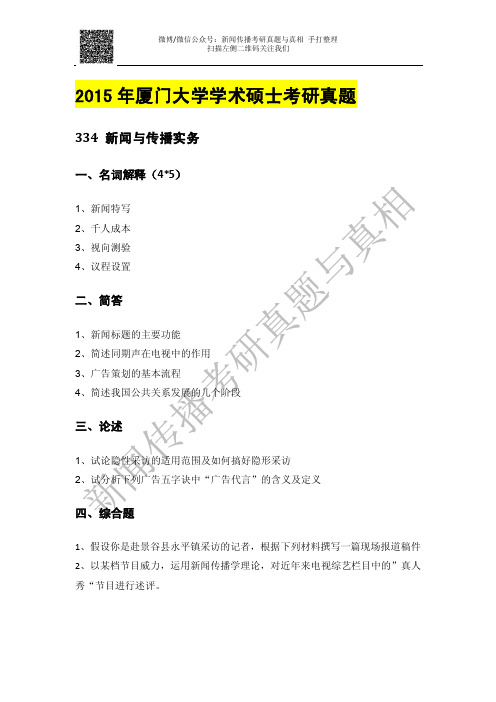
2015年厦门大学学术硕士考研真题334 新闻与传播实务一、名词解释(4*5)1、新闻特写2、千人成本3、视向测验4、议程设置二、简答1、新闻标题的主要功能2、简述同期声在电视中的作用3、广告策划的基本流程4、简述我国公共关系发展的几个阶段三、论述1、试论隐性采访的适用范围及如何搞好隐形采访2、试分析下列广告五字诀中“广告代言”的含义及定义四、综合题1、假设你是赴景谷县永平镇采访的记者,根据下列材料撰写一篇现场报道稿件2、以某档节目威力,运用新闻传播学理论,对近年来电视综艺栏目中的”真人秀“节目进行述评。
2014厦门大学学术硕士考研真题804 新闻与传播实务一、名词解释1、买后感觉2、广告文案3、议题管理4、连线报道5、固定画面二、简答题1、简述危机发展的四个阶段2、简要论述我国电视言论从20世纪50年代起步发展至今经历的几个阶段3、对以下的广告五字决做出解释:媒体趋势:媒体之趋势,特点是基石;专业留杂志,分栏存报纸;广播入汽车,电视变形式;形象竖户外,互动线上立4、报纸版面和报纸内容的关系三、论述题1、论述电视新闻现场直播的实施2、举例说明广告定位理论的基本内容和意义四、综合题1、可口可乐的危机处理方式有什么值得借鉴的地方和不足之处2、有人说,新闻的美在于偶然性和突发性,请从电视现场直播的角度对此做一评价,并结合具体实例2013年厦门大学学硕真题804 新闻与传播实务一、名词解释1、专栏评论2、危机管理3、口播新闻4、定位5、广告代理制二、简答题1、电视新闻报道比其他报道的优势2、由外围向中心采访的好处3、写出广告五字决中关于传播效果的部分,并加以解释4、广告重复次数与广告效果之间的关系三、论述题1、新闻报道和新闻策划的关系2、USP与品牌形象定位理论的关系四、综合题1、举“归真堂”活熊取胆的例子,分析企业组织和非营利组织与媒介沟通模式的不同之处和相同之处2、李长春说各级政府要搞好与媒体的关系,要善于利用媒体,促进政府工作,写新闻评论2015年厦门大学学硕真题703 新闻与传播基础一、名词解释1、公共新闻2、中国新闻事业的基本性质3、媒介事件4、整合营销传播5、大清报律6、拟态环境二、简答1、《人民日报》改版的背景、意义、内容2、媒介事件对公共关系的作用3、对新闻专业理念的理解4、对电子乌托邦的理解?以及电子乌托邦可能实现吗三、论述题1、西方对媒体集团对媒体行业的合并和垄断有很强的危机感,而中国则不然,谈谈你的理解。
最新2015年全国硕士研究生入学统一考试英语二试题真题及答案详解
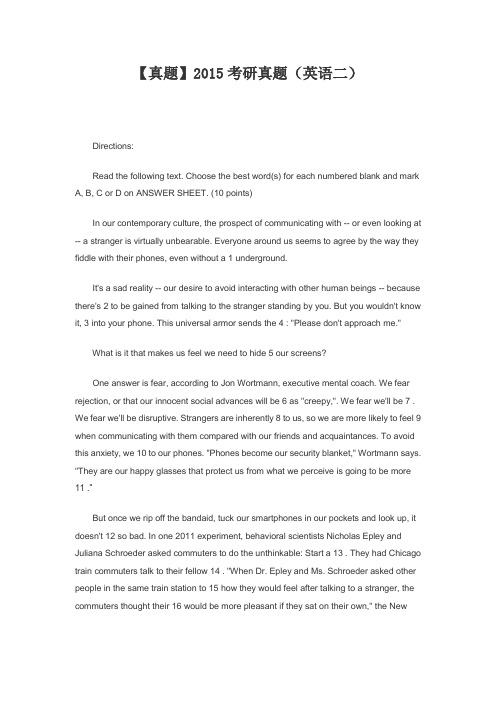
【真题】2015考研真题(英语二)Directions:Read the following text. Choose the best word(s) for each numbered blank and mark A, B, C or D on ANSWER SHEET. (10 points)In our contemporary culture, the prospect of communicating with -- or even looking at -- a stranger is virtually unbearable. Everyone around us seems to agree by the way they fiddle with their phones, even without a 1 underground.It's a sad reality -- our desire to avoid interacting with other human beings -- because there's 2 to be gained from talking to the stranger standing by you. But you wouldn't know it, 3 into your phone. This universal armor sends the 4 : "Please don't approach me."What is it that makes us feel we need to hide 5 our screens?One answer is fear, according to Jon Wortmann, executive mental coach. We fear rejection, or that our innocent social advances will be 6 as "creepy,". We fear we'll be 7 . We fear we'll be disruptive. Strangers are inherently 8 to us, so we are more likely to feel 9 when communicating with them compared with our friends and acquaintances. To avoid this anxiety, we 10 to our phones. "Phones become our security blanket," Wortmann says. "They are our happy glasses that protect us from what we perceive is going to be more 11 .”But once we rip off the bandaid, tuck our smartphones in our pockets and look up, it doesn't 12 so bad. In one 2011 experiment, behavioral scientists Nicholas Epley and Juliana Schroeder asked commuters to do the unthinkable: Start a 13 . They had Chicago train commuters talk to their fellow 14 . "When Dr. Epley and Ms. Schroeder asked other people in the same train station to 15 how they would feel after talking to a stranger, the commuters thought their 16 would be more pleasant if they sat on their own," the NewYork Times summarizes. Though the participants didn't expect a positive experience, after they 17 with the experiment, "not a single person reported having been snubbed."18 , these commutes were reportedly more enjoyable compared with those sans communication, which makes absolute sense, 19 human beings thrive off of social connections. It's that 20 : Talking to strangers can make you feel connected.1. [A] ticket [B] permit [C] signal [D] record2. [A] nothing [B] link [C] another [D] much3. [A] beaten [B] guided [C] plugged [D] brought4. [A] message [B] cede [C] notice [D] sign5. [A] under [B] beyond [C] behind [D] from6. [A] misinterpret [B] misapplied [C] misadjusted [D] mismatched7. [A] fired [B] judged [C] replaced [D] delayed8. [A] unreasonable [B] ungrateful [C] unconventional [D] unfamiliar9. [A] comfortable [B] anxious [C] confident [D] angry10. [A] attend [B] point [C] take [D] turn11. [A] dangerous [B] mysterious [C] violent [D] boring12. [A] hurt [B] resist [C] bend [D] decay13. [A] lecture [B] conversation [C] debate [D] negotiation14. [A] trainees [B] employees [C] researchers [D] passengers15. [A] reveal [B] choose [C] predict [D] design16. [A] voyage [B] flight [C] walk [D] ride17. [A] went through [B] did away [C] caught up [D] put up18. [A] In turn [B] In particular [C] In fact [D] In consequence19. [A] unless [B] since [C] if [D] whereas20. [A] funny [B] simple [C] logical [D] rareSection II Reading ComprehensionPart ADirections:Read the following four texts. Answer the questions below each text by choosing A, B, C or D. Mark your answers on ANSWER SHEET. (40 points)Text 1A new study suggests that contrary to most surveys, people are actually more stressed at home than at work. Researchers measured people‟s cortisol, which is a stress marker, while they were at work and while they were at home and found it higher at what is supposed to be a place of refuge.“Further contradicting conventional wisdom, we found that women as well as men have lower levels of stress at work than at home, ” writes one of the researchers, Sarah Damske. In fact women even say they feel better at work, she notes.“ It is men, not women, who report being happier at home than at work. ”Another surprise is that findings hold true for both those with children and without, but more so for nonparents. This is why people who work outside the home have better health.What the study doesn‟t measure is whether people are still doing work when they‟re at home, whether it is household work or work brought home from the office. For many men, the end of the workday is a time to kick back. For women who stay home, they never get to leave the office. And for women who work outside the home, they often are playing catch-up-with-household tasks. With the blurring of roles, and the fact that the home frontlags well behind the workplace a making adjustments for working women, it‟s not surprising that women are more stressed at home.But it‟s not just a gender thing. At work, people pretty much know what they‟re supposed to be doing: working, marking money, doing the tasks they have to do in order to draw an income. The bargain is very pure: Employee puts in hours of physical or mental labor and employee draws out life-sustaining moola.On the home front, however, people have no such clarity. Rare is the household in which the division of labor is so clinically and methodically laid out. There are a lot of tasks to be done, there are inadequate rewards for most of them. Your home colleagues-your family-have no clear rewards for their labor; they need to be talked into it, or if they‟re teenagers, threatened with complete removal of all electronic devices. Plus, they‟re your family. You cannot fire your family. You never really get to go home from home.So it‟s not surprising that people are more stressed at home. Not only are the tasks apparently infinite, the co-workers are much harder to motivate.21.According to Paragraph 1,most previous surveys found that home_____[A] offered greater relaxation than the workplace[B] was an ideal place for stress measurement[C] generated more stress than the workplace[D] was an unrealistic place for relaxation22. According to Damaske, who are likely to be the happiest at home?[A] Childless wives[B] Working mothers[C] Childless husbands[D] Working fathers23.The blurring of working women's roles refers to the fact that_____[A] it is difficult for them to leave their office[B] their home is also a place for kicking back[C] there is often much housework left behind[D] they are both bread winners and housewives24.The word“moola”(Line4,Para4)most probably means_____[A] skills[B] energy[C] earnings[D] nutrition25.The home front differs from the workplace in that_____[A] division of labor at home is seldom clear-cut[B] home is hardly a cozier working environment[C] household tasks are generally more motivating[D] family labor is often adequately rewardedText 2For years, studies have found that first-generation college students- those who do not have a parent with a college degree- lag other students on a range of education achievement factors. Their grades are lower and their dropout rates are higher. But since such students are most likely to advance economically if they succeed in higher education,colleges and universities have pushed for decades to recruit more of them. This has created “a paradox” in that recruiting first- generation students, but then watching many of them fail, means that highe r education has “continued to reproduce and widen, rather than close” ab achievement gap based on social class, according to the depressing beginning of a paper forthcoming in the journal Psychological Science.But the article is actually quite optimistic, as it outlines a potential solution to this problem, suggesting that an approach (which involves a one-hour, next-to-no-cost program) can close 63 percent of the achievement gap (measured by such factors as grades) between first-generation and other students.The authors of the paper are from different universities, and their findings are based on a study involving 147 students ( who completed the project) at an unnamed private university. First generation was defined as not having a parent with a four-year college degree. Most of the first-generation students(59.1 percent) were recipients of Pell Grants, a federal grant for undergraduates with financial need, while this was true only for 8.6 percent of the students wit at least one parent with a four-year degree.Their thesis- that a relatively modest intervention could have a big impact- was based on the view that first-generation students may be most lacking not in potential but in practical knowledge about how to deal with the issues that face most college students. They cite past research by several authors to show that this is the gap that must be narrowed to close the achievement gap.Many first- generation students “struggle to navigate the middle-class culture of higher education, learn the …rules of the game,‟ and take advantage of college resources,” they write. And this becomes more of a problem when collages don‟t talk about the class advantage and disadvantages of different groups of students. Because US colleges and universities seldom acknowledge h ow social class can affect students ‟educational experience, many first-generation students lack sight about why they are struggling and do not understand how students‟ like them can improve.26. Recruiting more first- generation students has_______[A] reduced their dropout rates[B] narrowed the achievement gap[C] missed its original purpose[D] depressed college students27. The author of the research article are optimistic because_______[A] the problem is solvable[B] their approach is costless[C] the recruiting rate has increased[D] their finding appeal to students28. The study suggests that most first- generation students______[A] study at private universities[B] are from single-parent families[C] are in need of financial support[D] have failed their collage29. The author of the paper believe that first-generation students_______[A] are actually indifferent to the achievement gap[B] can have a potential influence on other students[C] may lack opportunities to apply for research projects[D] are inexperienced in handling their issues at college30. We may infer from the last paragraph that_______[A] universities often reject the culture of the middle-class[B] students are usually to blame for their lack of resources[C] social class greatly helps enrich educational experiences[D]colleges are partly responsible for the problem in questionText 3Even in traditional offices, “the lingua franca of corporate America has gotten much more emotional and much more right-brained than it was 20 years ago,” said Harvard Business School professor Nancy Koehn. She started spinning off examples. “If you and I parachuted back to Fortune 500 companies in 1990, we would see much less frequent use of terms like journey, mission, passion. There were goals, there were strategies, there were objectives, but we didn‟t talk about energy; we didn‟t talk about passion.”Koehn pointed out that this new era of corporate vocabulary is very“team”-oriented—and not b y coincidence. “Let‟s not forget sports—in male-dominated corporate America, it‟s still a big deal. It‟s not explicitly conscious; it‟s the idea that I‟m a coach, and you‟re my team, and we‟re in this together. There are lots and lots of CEOs in very different companies, but most think of themselves as coaches and this is their team and they want to win.”These terms are also intended to infuse work with meaning—and, as Khurana points out, increase allegiance to the firm. “You have the importation of term inology that historically used to be associated with non-profit organizations and religious organizations: Terms like vision, values, passion, and purpose,” said Khurana.This new focus on personal fulfillment can help keep employees motivated amid increasingly loud debates over work-life balance. The “mommy wars” of the 1990s are still going on today, prompting arguments about why women still can‟t have it all and books like Sheryl Sandberg‟s Lean In, whose title has become a buzzword in its own right.Terms like unplug, offline, life-hack, bandwidth, and capacity are all about setting boundaries between the office and the home. But if your work is your “passion,” you‟ll be more likely to devote yourself to it, even if that means going home for dinner and then working long after the kids are in bed.But this seems to be the irony of office speak: Everyone makes fun of it, but managers love it, companies depend on it, and regular people willingly absorb it. As Nunberg said, “You can get people to think it‟s nonsense at the same time that you buy into it.” In a workplace that‟s fundamentally indifferent to your life and its meaning, office speak can help you figure out how you relate to your work—and how your work defines who you are.31. According to Nancy Koehn, office language has become_____[A] more emotional[B] more objective[C] less energetic[D] less strategic32. “Team”-oriented corporate vocabulary is closely related to_______[A] historical incidents[B] gender difference[C] sports culture[D] athletic executives33.Khurana believes that the importation of terminology aims to______[A] revive historical terms[B] promote company image[C] foster corporate cooperation[D] strengthen employee loyalty34.It can be inferred that Lean In________[A] voices for working women[B] appeals to passionate workaholics[C] triggers debates among mommies[D] praises motivated employees35.Which of the following statements is true about office speak?[A] Managers admire it but avoid it[B] Linguists believe it to be nonsense[C] Companies find it to be fundamental[D] Regular people mock it but accept itText 4Many people talked of the 288,000 new jobs the Labor Department reported for June, along with the drop in the unemployment rate to 6.1 percent, as good news. And they were right. For now it appears the economy is creating jobs at a decent pace. We still have a long way to go to get back to full employment, but at least we are now finally moving forward at a faster pace.However, there is another important part of the jobs picture that was largely overlooked. There was a big jump in the number of people who repot voluntarily working part-time. This figure is now 830,000(4.4 percent)above its year ago level.Before explaining the connection to the Obamacare, it is worth making an important distinction. Many people who work part-time jobs actually want full-time jobs. They take part-time work because this is all they can get. An increase in involuntary part-time work is evidence of weakness in the labor market and it means that many people will be having a very hard time making ends meet.There was an increase in involuntary part-time in June, but the general direction has been down. Involuntary part-time employment is still far higher than before the recession, but it is down by 640,000(7.9percent)from is year ago level.We know the difference between voluntary and involuntary part-time employment because people tell us. The survey used by the Labor Department asks people is they worked less than 35 hours in the reference week. If the answer is “yes”, they are classified as worked less than 35hours in that week because they wanted to work less than full time or because they had no choice .They are only classified as voluntary part-time workers if they tell the survey taker they chose to work less than 35 hours a week.The issue of voluntary part-time relates to Obamacare because one of the main purposes was to allow people to get insurance outside of employment. For many people , especially those with serious health conditions or family members with serious health conditions ,before Obamacare the only way to get insurance was through a job that provided health insurance.However, Obamacare has allowed more than 12 million people to either get insurance through Medicaid or the exchanges. These are people who may previously have felt the need to get a full-time job that provided insurance in order to cover themselves and their families. With Obamacare there is no longer a link between employment and insurance.36. Which part of the jobs picture are neglected?[A] The prospect of a thriving job market.[B] The increase of voluntary part-time market.[C] The possibility of full employment.[D] The acceleration of job creation.37. Many people work part-time because they_____.[A] prefer part-time jobs to full-time jobs.[B] feel that is enough to make ends meet.[C] cannot get their hands on full-time jobs.[D] haven‟t seen the weakness of the market.38. Involuntary part-time employment is the US_____.[A] is harder to acquire than one year ago.[B] shows a general tendency of decline.[C] satisfies the real need of the jobless.[D] is lower than before the recession.39. It can be learned that with Obamacare,_____.[A] it is no longer easy for part-timers to get insurance[B] employment is no longer a precondition to get insurance[C] it is still challenging to get insurance for family members[D] full-time employment is still essential for insurance40. The text mainly discusses_______.[A] employment in the US[B] part-timer classification[C] insurance though Medicaid[D] Obamacare‟s troublePart BDirections:In the following text, some sentences have been removed. For Questions 41-45, choose the most suitable one from the list [A]-[G] to fit into each of the numbered blank. There are two extra choices, which do not fit in any of the gaps. Mark your answers on ANSWER SHEET. (10 points)[A] You are not alone[B] Don‟t fear responsibility for your life[C] Pave your own unique path[D] Most of your fears are unreal[E] Think about the present moment[F] Experience helps you grow[G] There are many things to be grateful forUnfortunately, life is not a bed of roses. We are going through life facing sad experiences. Moreover, we are grieving various kinds of loss: a friendship, a romantic relationship or a house. Hard times may hold you down at what usually seems like the most inopportune time, but you should remember that they won‟t last forever.When our time of mourning is over, we press forward, stronger with a greater understanding and respect for life. Furthermore, these losses make us mature andeventually move us toward future opportunities for growth and happiness. I want to share these ten old truths I‟ve learned along the way.41._____________________________Fear is both useful and harmful. This normal human reaction is used to protect us by signaling danger and preparing us to deal with it. Unfortunately, people create inner barriers with a help of exaggerating fears. My favorite actor Will Smith once said, “Fear is not real. It is a product of thoughts you create. Do not misunderstand me. Danger is very real. But fear is a choice.” I do completely agree that fears are just the product of our luxuriant imagination.42_____________________________If you are surrounded by problems and cannot stop thinking about the past, try to focus on the present moment. Many of us are weighed down by the past or anxious about the future. You may feel guilt over your past, but you are poisoning the present with the things and circumstances you cannot change. Value the present moment and remember how fortunate you are to be alive. Enjoy the beauty of the world around and keep the eyes open to see the possibilities before you. Happiness is not a point of future and not a moment from the past, but a mindset that can be designed into the present.43______________________________Sometimes it is easy to feel bad because you are going through tough times. You can be easily caught up by life problems that you forget to pause and appreciate the things you have. Only strong people prefer to smile and value their life instead of crying and complaining about something.44________________________________No matter how isolated you might feel and how serious the situation is, you should always remember that you are not alone. Try to keep in mind that almost everyone respects and wants to help you if you are trying to make a good change in your life, especially your dearest and nearest people. You may have a circle of friends who provideconstant good humor, help and companionship. If you have no friends or relatives, try to participate in several online communities, full of people who are always willing to share advice and encouragement.45________________________________Today many people find it difficult to trust their own opinion and seek balance by gaining objectivity from external sources. This way you devalue your opinion and show that you are incapable of managing your own life. When you are struggling to achieve something important you should believe in yourself and be sure that your decision is the best. You live in your skin, think your own thoughts, have your own values and make your own choices.Section III TranslationDirections:Translate the following text from English into Chinese. Write your translation on ANSWER SHEET 2. (15 points)Think about driving a route that‟s very familiar. It could be your commute to work, a trip into town or the way home. Whichever it is, you know every twist and turn like the back of your hand. On these sorts of trips it‟s easy to zone out from the actual driving and pay little attention to the passing scenery. The consequence is that you perceive that the trip has taken less time than it actually has.This is the well-travelled road effect: people tend to underestimate the time it takes to travel a familiar route.The effect is caused by the way we allocate our attention. When we travel down a well-known route, because we don‟t have to concentrate much, time seems to flow more quickly. And afterwards, when we come to think back on it, we can‟t remember the journey well because we didn‟t pay much attention to it. So we assume it was shorter.Section IV WritingPart A47. Directions:Suppose your university is going to host a summer camp for high school students. Write a notice to1) briefly introduce the camp activities, and2) call for volunteers.You should write about 100 words on the ANSWER SHEET.Do not use your name or the name of your university.Do not write your address. (10 points)Part B48. Directions:Write an essay based on the following chart. In your writing, you should1) interpret the chart, and2) give your comments.You should write about 150 words on the ANSWER SHEET. (15 points)。
历年厦门大学考研复试经验汇总-厦大考研复试流程全攻略!-厦大考研复试如何准备?-厦大面试技巧有哪些?

历年厦门大学考研复试经验汇总——厦门大学考研面试流程全攻略!考研经验对于新一届的考研党来说含金量很高,优秀的经验能让你少走许多弯路,可以提前知晓考试重点、备考侧重、注意事项等。
特别是考研复试经验,听厦门大学同专业过来人讲述面试流程、备考攻略……这些信息,尤为珍贵!群贤厦大考研网()整理了部分厦门大学往届优秀学长学姐的复试经验,在复试之前,各位考生可以停下来阅读阅读,看看厦门大学往年的复试现场和学长学姐的备考以及临场经验,从中学习合适的方法并运用到自己的复习进程中,或许会让你的复试之旅信心倍增。
欲知更多厦门大学考研详情,请点击进入【厦大考研真题答案】。
[群贤厦大考研网] 2018厦门大学经济学院考研复试经验及流程分享[群贤厦大考研网] 2018厦门大学会计考研复试经验分享[群贤厦大考研网] 2018厦门大学法学院学硕考研复试经验分享[群贤厦大考研网] 2018厦门大学会计学硕考研复试回忆(含真题)[群贤厦大考研网] 2018厦门大学汉硕考研复试心得分享[群贤厦大考研网] 2018厦门大学会计学硕考研复试经验分享(含真题)[群贤厦大考研网] 2018厦门大学语言学及应用语言学考研复试经验分享[群贤厦大考研网] 2018厦门大学马克思主义学院考研复试经验分享[群贤厦大考研网] 2018厦门大学翻译硕士MTI笔译考研复试经验分享[群贤厦大考研网] 2018厦门大学二战传播学考研复试感想分享[群贤厦大考研网] 2018厦门大学MPAcc考研复试真题分享[群贤厦大考研网] 2018厦门大学MPAcc考研复试面试题目分享[群贤厦大考研网] 2018厦门大学航空航天学院考研复试心得[群贤厦大考研网] 2017年厦门大学新闻传播考研复试经验分享[群贤厦大考研网] 2017年厦门大学中文系701+802考研复试经验[群贤厦大考研网] 2017年厦门大学数理统计考研复试经验[群贤厦大考研网] 2017年厦门大学口译硕士考研试复试经验[群贤厦大考研网] 2017年厦门大学财会院财务学考研复试经验[群贤厦大考研网] 2017年厦门大学mpacc之考研复试经验[群贤厦大考研网] 2017年厦门大学企业管理考研复试经验贴[群贤厦大考研网] 2017年厦门大学mpacc考研复试经验[群贤厦大考研网] 2017年厦门大学金融工程考研复试经验[群贤厦大考研网] 2017年厦门大学翻硕考研复试感想[群贤厦大考研网] 2017年厦门大学mpacc复试-笔试题目详细回忆[群贤厦大考研网] 2016年厦门大学汉语国际教育考研复试经验回顾[群贤厦大考研网] 2016年厦门大学企业管理第一名考研复试经验与17指导(超详细)[群贤厦大考研网] 2016年厦门大学企业管理考研复试真题[群贤厦大考研网] 2016年厦门大学英语语言文学考研复试经验[群贤厦大考研网] 2016年厦门大学通信工程系考研复试经验[群贤厦大考研网] 2016年厦门大学翻译硕士英语笔译考研复试经验[群贤厦大考研网] 2016年厦门大学翻译硕士英语口译考研复试经验回顾[群贤厦大考研网] 2016年厦门大学经济学院考研复试经验回顾[群贤厦大考研网] 2016年厦门大学会计专硕考研复试真题与经验[群贤厦大考研网] 2016年厦门大学新传考研复试真题与经验[群贤厦大考研网] 2016年厦门大学财务学考研复试真题[群贤厦大考研网] 2015年厦门大学自动化系控制工程考研复试经验[群贤厦大考研网] 2015年厦门大学管理学院管理科学系考研复试经验[群贤厦大考研网] 2015年厦门大学经济学院考研复试真题与经验(专业课英语面试)[群贤厦大考研网] 2015年厦门大学经济学院考研复试真题与经验(专业课中文面试)[群贤厦大考研网] 2015年厦门大学经济学院考研复试真题与经验(英语笔试)[群贤厦大考研网] 2015年厦大电子与通信工程(专硕)考研面试与笔试真题回顾[群贤厦大考研网] 2015年厦门大学翻译硕士考研复试经验[群贤厦大考研网] 2015年厦门大学国贸系考研复试经验群贤厦大考研网链接地址:/【厦大考研真题答案】链接地址:/kaoyan/[群贤厦大考研网] 2015年厦门大学会计系考研复试真题回顾(笔试+面试)[群贤厦大考研网] 2015年厦门大学管理学院市场营销考研复试经验[群贤厦大考研网] 2015年厦门大学统计系国民经济学考研复试经验[群贤厦大考研网] 2015年厦门大学企业管理考研复试真题[群贤厦大考研网] 2015年厦门大学刑法学考研复试真题[群贤厦大考研网] 2015年厦门大学控制所自动化考研复试经验回顾[群贤厦大考研网] 2015年厦门大学新闻传播学院考研复试流程与真题回顾[群贤厦大考研网] 2015年厦门大学新闻传播考研复试真题与经验[群贤厦大考研网] 2015年厦门大学自动化系考研复试真题[群贤厦大考研网] 2015年厦门大学管理学院财务学考研复试真题[群贤厦大考研网] 2015年厦门大学电子与通信工程专硕考研复试真题及经验[群贤厦大考研网] 2015年厦门大学会计专硕mpacc考研复试真题(笔试+面试)[群贤厦大考研网] 2014年厦门大学翻译硕士考研复试经历[群贤厦大考研网] 2014年厦门大学通信系电子与通信工程专硕考研复试经验[群贤厦大考研网] 2014年厦门大学新闻传播学考研复试经验[群贤厦大考研网] 2014年厦门大学经济学院能源中心考研复试真题[群贤厦大考研网] 2014年厦门大学中国哲学考研复试真题[群贤厦大考研网] 2014年厦门大学广告学第一名考研复试经验[群贤厦大考研网] 2014年厦门大学资产评估专硕考研复试经验[群贤厦大考研网] 2014年厦门大学资产评估专硕考研面试考题汇总[群贤厦大考研网] 2014年厦门大学应用统计考研复试经验[群贤厦大考研网] 2014年厦门大学经济学院各专业考研复试真题(英语笔试)[群贤厦大考研网] 2014年厦门大学WISE考研复试经验[群贤厦大考研网] 2014年厦门大学投资学考研复试经验回顾[群贤厦大考研网] 2014年厦门大学金融学考研复试真题与经验[群贤厦大考研网] 2014年厦门大学社会学考研复试真题[群贤厦大考研网] 2014年厦门大学宪法与行政法考研复试真题与经验[群贤厦大考研网] 2014年厦门大学机械制造基础考研复试真题[群贤厦大考研网] 2014年厦门大学旅游管理考研复试真题与经验[群贤厦大考研网] 2014年厦门大学会计审计硕士考研复试真题(面试)[群贤厦大考研网] 2014年厦门大学会计硕士考研复试真题完整版[群贤厦大考研网] 2014年厦门大学管理学院财务学考研复试真题与经验[群贤厦大考研网] 2014年厦门大学企业管理考研复试真题与经验回顾[群贤厦大考研网] 2014年厦门大学财政学考研复试经验[群贤厦大考研网] 2014厦门大学经济学院考研复试经验指南[群贤厦大考研网] 2014厦大考研会计学面试真题分享【面试+笔试】[群贤厦大考研网] 2014年厦门大学考研管理学院市场营销复试真题(回忆版)[群贤厦大考研网] 2014厦门大学考研会计硕士MPAcc初试+复试经验分享[群贤厦大考研网] 2014年厦门大学统计系考研复试真题与经验分享[群贤厦大考研网] 2014年厦门大学考研汉语教育硕士复试经验分享群贤厦大考研网链接地址:/【厦大考研真题答案】链接地址:/kaoyan/[群贤厦大考研网] 2013年厦门大学高分子化学考研复试经验[群贤厦大考研网] 2013年厦门大学英语翻译硕士考研复试经验[群贤厦大考研网] 2013年厦门大学机械制造基础考研复试真题[群贤厦大考研网] 2013年厦门大学机械制造基础考研复试经验[群贤厦大考研网] 2013年厦门大学市场营销学考研复试真题与经验[群贤厦大考研网] 2013年厦门大学会计学考研复试真题(笔试+面试)[群贤厦大考研网] 2013年厦门大学财政系考研复试经历与总结[群贤厦大考研网] 2013年厦门大学金融学考研复试经验回顾[群贤厦大考研网] 2013厦大金融学考研复试经验分享[群贤厦大考研网] 2012年厦门大学新闻传播考研复试经验[群贤厦大考研网] 2012年厦门大学设计艺术学考研复试经验[群贤厦大考研网] 2012年厦门大学电路与系统考研复试真题与经验[群贤厦大考研网] 2012年厦门大学市场营销学考研复试真题[群贤厦大考研网] 2012年厦门大学企业管理考研复试真题(笔试)[群贤厦大考研网] 2012年厦门大学管理学院财务系考研复试真题与心得[群贤厦大考研网] 2012年厦门大学经济系考研复试流程回顾[群贤厦大考研网] 2012厦门大学考研国民经济学复试经验分享[群贤厦大考研网] 2012年厦门大学财政系考研复试真题与经验[群贤厦大考研网] 2012年厦门大学艺术学院考研复试经验[群贤厦大考研网] 2011年厦门大学海院汉硕考研复试经验[群贤厦大考研网] 2011年厦门大学计算机考研复试真题(笔试)[群贤厦大考研网] 2011年厦门大学考研财政复试经验[群贤厦大考研网] 2011厦门大学考研艺术类复试经验[群贤厦大考研网] 2010年厦门大学电子系考研复试真题(笔试)[群贤厦大考研网] 2010年厦门大学法硕考研复试真题(笔试)[群贤厦大考研网] 2010年厦门大学法硕考研复试经历[群贤厦大考研网] 2010年厦门大学自动化双控考研复试经验[群贤厦大考研网] 2010年厦门大学金融学考研复试真题与经验[群贤厦大考研网] 厦大考研过来人提考研复试失败的四点原因[群贤厦大考研网] 2010年厦门大学考研王亚南经济研究院复试经验[群贤厦大考研网] 2010年厦门大学考研自动化复试经验[群贤厦大考研网] 2010厦门大学考研王亚南经济研究院复试经验群贤厦大考研网链接地址:/【厦大考研真题答案】链接地址:/kaoyan/。
2015厦门大学翻译硕士考研——科究竟如何复习
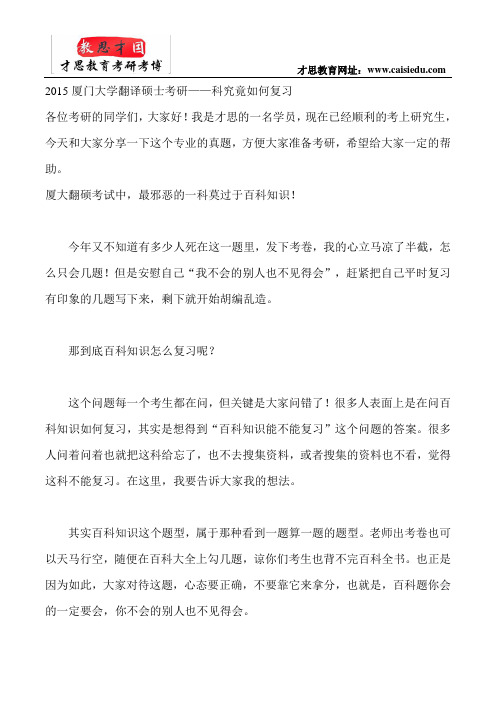
2015厦门大学翻译硕士考研——科究竟如何复习各位考研的同学们,大家好!我是才思的一名学员,现在已经顺利的考上研究生,今天和大家分享一下这个专业的真题,方便大家准备考研,希望给大家一定的帮助。
厦大翻硕考试中,最邪恶的一科莫过于百科知识!今年又不知道有多少人死在这一题里,发下考卷,我的心立马凉了半截,怎么只会几题!但是安慰自己“我不会的别人也不见得会”,赶紧把自己平时复习有印象的几题写下来,剩下就开始胡编乱造。
那到底百科知识怎么复习呢?这个问题每一个考生都在问,但关键是大家问错了!很多人表面上是在问百科知识如何复习,其实是想得到“百科知识能不能复习”这个问题的答案。
很多人问着问着也就把这科给忘了,也不去搜集资料,或者搜集的资料也不看,觉得这科不能复习。
在这里,我要告诉大家我的想法。
其实百科知识这个题型,属于那种看到一题算一题的题型。
老师出考卷也可以天马行空,随便在百科大全上勾几题,谅你们考生也背不完百科全书。
也正是因为如此,大家对待这题,心态要正确,不要靠它来拿分,也就是,百科题你会的一定要会,你不会的别人也不见得会。
所以,对于百科,大家能做的就是先去搜集一些比较全面的资料,然后扎扎实实把他们掌握了就可以自信地上考场了,不用多余的担心。
没有几个人真的能know it all!翻译硕士高校排名第一批:1.北大招生30名,其中推免202.北外英语笔译60名(学制两年)(好像除了翻译基础和汉语百科,会考俄日法德其中一门二外)3.南开英语口笔译非在职和在职生各招收30名4.复旦英语笔译30名5.同济英语笔译德语笔译未列招生人数6.上海交大英语笔译未列招生人数7.上外英语笔译35人(下设法律翻译,公/商务笔译,专业编译三个方向)英语口译15人(下设会议口译方向,公/商务口译方向和陪同口译方向)法语口译5人8.南大英语笔译35人9.厦大英语口笔译各15人10.中南大学英语口笔译未列招生人数11.湖南师范英语口笔译未列招生人数12.中山英语笔译20人英语口译10人13.西南大学英语笔译未列招生人数14.广外英语笔译60人英语口译40人日语笔译20人日语口译10人法语口译10人其中英语翻译硕士复试参考书目991|翻译实务(笔译):1、《实用翻译教程(修订版)》,刘季春主编,中山大学出版社,2007年。
2015年外交学院MTI翻译硕士英语考研真题,考研经验

2015年外交学院MTI翻译硕士英语考研真题基础英语1.20个单项选择。
考词汇和语法,专八水平。
2.10个改错。
给出一小篇文章,在10行画线句子中找错。
比专八改错简单些。
3.6篇阅读。
外院每年都是6篇阅读,前五篇是选择,题目难度不大,基本上都可以从原文中找到,但要细心。
其中还有一篇是要在几个句子里,选出填到原文空缺处的考题。
最后一篇有变化,去年是考的问答,今年是给文章的每一段选一个可以概括该段的句子,总共需要选出5个,但给出了10个选项,需要认真分析,仔细阅读。
4.作文。
The function of a university(at least400words)前面给了几句不同人的看法,关于大学要不要提供和工作有关的课程。
减词省略词语不意味着可以随意删节原文的词句,而必须遵守一些原则:省去的词语必须是(1)在译文中看来是可有可无的,或是多余的;(2)其意思已经包含在上下文里;(3)其含义在译文中是不言而喻的。
汉译英中所省略的词语可以分成一下几类:(一)原文中重复出现的词语资料来源:育明考研考博官网资料来源:育明考研考博官网汉语中为了讲究句子的平衡、气势、韵调常常使用排比、重复等修辞手段。
如果照样一连串译成英语,往往不合英语的习惯。
因此翻译时,原文中含义重复的词语往往只译出其中一个,其他可以省略不翻译。
例20原文:青年人的觉悟程度如何,道德品质如何,知识水平如何,直接关系着社会主义建设的速度,关系着祖国的未来。
译文:how the youth come up in political consciousness,in moral qualities and in intellectual attainments has a direct bearing on the speed of socialist construction and the future of our mother land例21原文:英国人坐着思考问题,法国人站着思考问题,美国人走着思考问题,爱尔兰人事后思考问题。
【真题回忆版】2015厦大考研:英语翻硕

/【真题回忆版】2015厦大考研:英语翻硕本内容由聚英厦门大学研究生招生信息网为大家收集有关厦门大学考研信息:翻译硕士英语单选难度不大,还考了几道之前做过的(貌似是其他学校的真题),切记一定要打好基础,扩大词汇量,改错题偏简单(我一直以为是类似专八的改错(换词,删词,添词),后来发现原来只是换词,还是要夯实基础,阅读应该属于专八难度,出题较巧,既要注意细节,又要注重宏观的把握,今年考了一篇专八06 年阅读A,讲网络大学的,一篇关注海洋生物的文章,一篇我竟然没印象了。
一篇黑格尔对美学的看法,看完我也是醉了,不好理解。
大作文是谈在信息时代,对培根Of Studies 中提出的:“Some books also may be read by deputy, and extractsmade of them by others" 的看法。
英语翻译基础汉译英比较简单,考了:法治,基层民主,香港特别行政区,巡回法庭,司法公正,拔尖人才,救死扶伤,吸收世界文明成果,独立关税区,海水淡化工程,纳尔逊.曼德拉,安特卫普,半官方协议什么来着……英译汉就哭瞎了,考了arcade building, enclosure movement,metallurgy,equivocal,vacillation,put out all the stops,flash sale, GOP,VIE(缩略词有给出全称)还有几个完全不认识的,记不得了。
两篇英译汉,感觉比往年篇幅长,第一篇讲了会计的历史,难度偏大,第二篇讲的是写作艺术和写作技巧的比较;两篇汉译英,第一篇讲教育与收入的关系,第二篇介绍西藏(解放前后的对比)。
总体感觉是篇幅长了不多,难度中上。
百科知识与汉语写作百科知识今年变化好大,由之前的25 道问答题变成了10 道简单题,每题5 分,有些压根没见过,所以直接哭瞎。
今年考了《诗经.采薇》主人公职业,要去往何处,来到何处;“色不异空,空不异色,色即是空,空即是色”出自哪部佛经,怎么翻译及如何理解;德国哲学家提出的轴心时代的概念;莎士比亚《奥德赛》的主题;《史记》作者司马迁为什么受宫刑以及写作《史记》的目的(用他自己引述的话);汉字六书并分别举一例;欧洲文明的两个源头及其原因;三权分立的内容,出自哪个人的哪部作品;西洋音乐主要流派;应用文写的是以辅/导员的身份给大一新生演讲致辞(已列出三个要点),和2010年的真题“如出一辙”;命题作文写的是“唯有源头活水来”。
厦门大学翻硕初复试各科题型回顾精
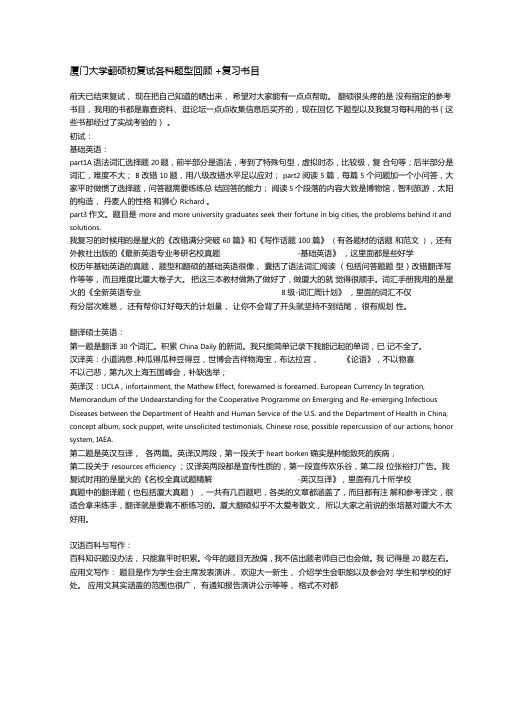
厦门大学翻硕初复试各科题型回顾+复习书目前天已结束复试,现在把自己知道的晒出来,希望对大家能有一点点帮助。
翻硕很头疼的是没有指定的参考书目,我用的书都是靠查资料、逛论坛一点点收集信息后买齐的,现在回忆下题型以及我复习每科用的书(这些书都经过了实战考验的)。
初试:基础英语:part1A 语法词汇选择题20 题,前半部分是语法,考到了特殊句型,虚拟时态,比较级,复合句等;后半部分是词汇,难度不大;B 改错10 题,用八级改错水平足以应对;part2 阅读5 篇,每篇5 个问题加一个小问答,大家平时做惯了选择题,问答题需要练练总结回答的能力;阅读5 个段落的内容大致是博物馆,智利旅游,太阳的构造,丹麦人的性格和狮心Richard 。
part3 作文。
题目是more and more university graduates seek their fortune in big cities, the problems behind it and solutions.我复习的时候用的是星火的《改错满分突破60 篇》和《写作话题100 篇》(有各题材的话题和范文),还有外教社出版的《最新英语专业考研名校真题-基础英语》,这里面都是些好学校历年基础英语的真题,题型和翻硕的基础英语很像,囊括了语法词汇阅读(包括问答题题型)改错翻译写作等等,而且难度比厦大卷子大。
把这三本教材做熟了做好了,做厦大的就觉得很顺手。
词汇手册我用的是星火的《全新英语专业8级-词汇周计划》,里面的词汇不仅有分层次难易,还有帮你订好每天的计划量,让你不会背了开头就坚持不到结尾,很有规划性。
翻译硕士英语:第一题是翻译30 个词汇。
积累China Daily 的新词。
我只能简单记录下我能记起的单词,已记不全了。
汉译英:小道消息,种瓜得瓜种豆得豆,世博会吉祥物海宝,布达拉宫,《论语》,不以物喜不以己悲,第九次上海五国峰会,补缺选举;英译汉:UCLA , infortainment, the Mathew Effect, forewarned is forearned. European Currency In tegration, Memorandum of the Undearstanding for the Cooperative Programme on Emerging and Re-emerging Infectious Diseases between the Department of Health and Human Service of the U.S. and the Department of Health in China, concept album, sock puppet, write unsolicited testimonials, Chinese rose, possible repercussion of our actions, honor system, IAEA.第二题是英汉互译,各两篇。
2015年翻译硕士考研真题,院校选择,考研重点讲解
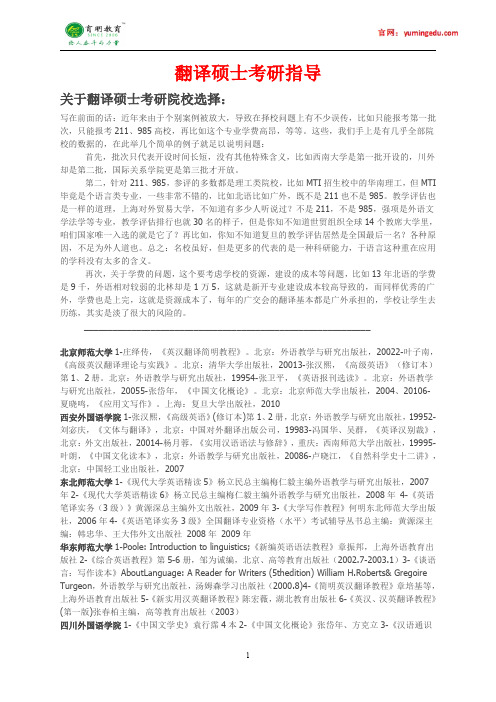
翻译硕士考研指导关于翻译硕士考研院校选择:写在前面的话:近年来由于个别案例被放大,导致在择校问题上有不少误传,比如只能报考第一批次,只能报考211、985高校,再比如这个专业学费高昂,等等。
这些,我们手上是有几乎全部院校的数据的,在此举几个简单的例子就足以说明问题:首先,批次只代表开设时间长短,没有其他特殊含义,比如西南大学是第一批开设的,川外却是第二批,国际关系学院更是第三批才开放。
第二,针对211、985,参评的多数都是理工类院校,比如MTI招生校中的华南理工,但MTI 毕竟是个语言类专业,一些非常不错的,比如北语比如广外,既不是211也不是985。
教学评估也是一样的道理,上海对外贸易大学,不知道有多少人听说过?不是211,不是985,强项是外语文学法学等专业,教学评估排行也就30名的样子,但是你知不知道世贸组织全球14个教席大学里,咱们国家唯一入选的就是它了?再比如,你知不知道复旦的教学评估居然是全国最后一名?各种原因,不足为外人道也。
总之:名校虽好,但是更多的代表的是一种科研能力,于语言这种重在应用的学科没有太多的含义。
再次,关于学费的问题,这个要考虑学校的资源,建设的成本等问题,比如13年北语的学费是9千,外语相对较弱的北林却是1万5,这就是新开专业建设成本较高导致的,而同样优秀的广外,学费也是上完,这就是资源成本了,每年的广交会的翻译基本都是广外承担的,学校让学生去历练,其实是淡了很大的风险的。
____________________________________________________________北京师范大学1-庄绎传,《英汉翻译简明教程》。
北京:外语教学与研究出版社,20022-叶子南,《高级英汉翻译理论与实践》。
北京:清华大学出版社,20013-张汉熙,《高级英语》(修订本)第1、2册。
北京:外语教学与研究出版社,19954-张卫平,《英语报刊选读》。
北京:外语教学与研究出版社,20055-张岱年,《中国文化概论》。
2015年厦门大学翻译硕士MTI考研真题答案及复习攻略
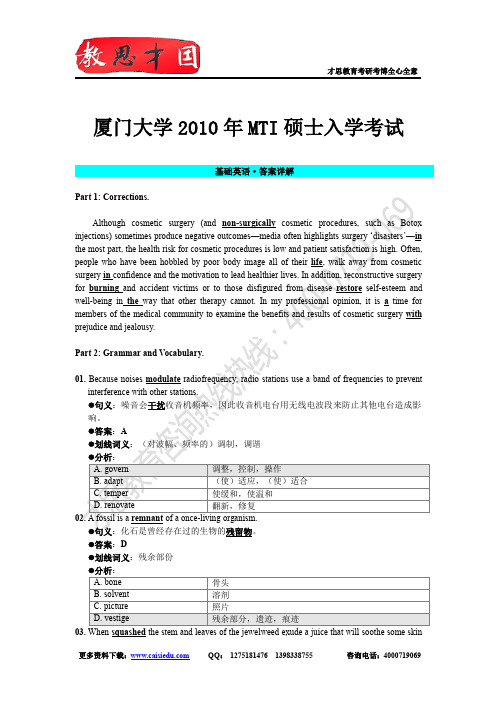
专心,专注
07. A fable is a didactic tale focused on a single character trail. 句义:寓言是围绕单一角色讲述的哲理故事。 答案:C 划线词义:教诲的,启发人的 分析:
更多资料下载: QQ: 1275181476 1398338755
咨询电话:4000719069
才思教育考研考博全心全意
irritations.
句义:将凤仙花的茎和叶压碎后,榨出的汁液可用于减轻皮肤刺痛。
答案:C
划线词义:压扁, 压烂
分析:
A. boiled
煮沸
B. aged
长大,变老
C. crushed
压碎,压坏
D. chopped
劈,切碎
04. The legislative filibuster is a parliamentary tactic designed to delay or prevent action by the
majority. 句义:妨碍议事是一种议会战术,旨在拖延或阻止多数人通过议案。 答案:D 划线词义:方法;战术;手段 分析:
A. tradition B. rule C. observance D. maneuver
传统 规定 遵守,奉行 策略,谋略
05. Ocean waves can cut imposing cliffs along coastlines. 句义:海浪可以沿着海岸线切割出壮观的悬崖。 答案:C 划线词义:壮观的,令人印象深刻的 分析:
editions. 句义:比起老版的字典,近些年出版的简明字典轻巧多了。 答案:D 划线词义:不灵便的,笨重的 分析:
A. complete
2015年考研英语翻译真题解析参考书考研真题考录比

1/10【育明教育】中国考研考博专业课辅导第一品牌官方网站: 开设课程:【网络函授班】【精品小班】【高端一对一】【状元集训营】【定向保录】1育明教育天津分校2015年天津地区15所高校考研辅导必备天津分校地址南京路新天地大厦2007专注考研专业课辅导8年天津地区专业课辅导第一品牌天津分校赵老师与大家分享资料育明教育,创始于2006年,由北京大学、中国人民大学、中央财经大学、北京外国语大学的教授投资创办,并有北京大学、武汉大学、中国人民大学、北京师范大学复旦大学、中央财经大学、等知名高校的博士和硕士加盟,是一个最具权威的全国范围内的考研考博辅导机构。
更多详情可联系育明教育天津分校赵老师。
2015年考研英语翻译真题解析参考书考研真题考录比针对考研翻译这个模块,2014年的考研大纲中没有任何变化,考生完全可以按照原来的步骤复习。
考研翻译考点如下:1.词汇层面个别词在具体语境中的翻译(尤其是名词、动词、形容词);代词;专有术语(人名、地名、机构名称);考研教育\网2.句法方面定语从句、状语从句、名词性从句(主语从句、宾语从句、表语从句、同位语从句)3.被动语态4.特殊结构2/10【育明教育】中国考研考博专业课辅导第一品牌官方网站: 开设课程:【网络函授班】【精品小班】【高端一对一】【状元集训营】【定向保录】2倒装结构、强调结构、插入结构、比较结构、否定结构、并列结构、省略结构等在前期的复习过程中,我们发现同学们要想拿到这个满分10分,还是具有一些难度的。
针对拆分后的每个分句(通过一定时间的练习,大家对拆分都有了一定的把控,基本上能把一个复杂的句子按照采分点分成2个,3个或四个分句),但是拆分完了如何组合,对于部分学生来说就是弱点了,因为拆分涉及到每个分句个别词的翻译是否准确到位,再就是针对各个分句如何来排序使之更加符合汉语表达习惯。
通过观察学生的译文我们发现学生的主要弱点是不擅长或者没有意识通过语境去调整词的意思。
厦大笔译硕士真题答案解析

厦大笔译硕士真题答案解析众所周知,厦门大学是一所享有盛誉的高等学府,其翻译硕士考试也备受广大学子关注。
在准备考试的过程中,了解并解析过去的真题是非常重要的,因为这样可以帮助考生更好地了解考试的难度和重点。
本文将对厦大笔译硕士真题进行解析,希望能对考生有所帮助。
首先,我们需要明确一点,翻译硕士考试的目的是考查考生的翻译能力和专业素养,因此,我们在解析真题时需要重点关注这两个方面。
以下是一道例题,让我们一起来解析一下:Question 1:The rise of e-commerce has revolutionized the way business is conducted. In the past, customers had to physically go to stores to make purchases. However, with the advent of online shopping, people can now buy almost anything from the comfort of their homes. This shift in consumer behavior has had a profound impact on the retail industry.According to recent studies, the e-commerce market is expected to grow exponentially in the coming years. This presents both opportunities and challenges for traditional retailers. On the one hand, online platforms offer a wider reach and lower operating costs. On the other hand, brick-and-mortar stores still provide a unique shopping experience and personalized customer service.As a translator, you are tasked with translating anarticle about the impact of e-commerce on the retail industry. In your translation, you should pay attention to the tone and style of the original text, as well as accurately conveyingthe main ideas and key points.Translate the following paragraph into Chinese:"With the rise of e-commerce, traditional retailers are forced to adapt or risk being left behind. While online shopping offers convenience and accessibility, brick-and-mortar stores have their own advantages. Physical storesallow customers to see and touch products before making a purchase. They also provide a social atmosphere and immediate assistance from sales personnel. However, in order to survive in today's competitive market, retailers must embrace digital technologies and enhance their online presence."解答:随着电子商务的兴起,传统零售商不得不适应,否则就会被淘汰。
2015年硕士英语考试真题及答案

2015年硕士英语考试真题及答案全文共6篇示例,供读者参考篇1The 2015 Master's English ExamHi there! My name is Timmy and I'm in the 5th grade. My older brother Mike just took the master's English exam last year to get into a fancy university. It was really hard! He studied like crazy for months. I helped him practice some of the questions and I want to tell you all about the exam he took. It was crazy!The reading section was super long. Mike said there were passages about science, history, literature, you name it! They gave him these massive reading passages, then asked all these tiny detail questions to see if he actually read and understood everything. Some of the questions were easy, like "What color was the bird mentioned in paragraph 3?" But others were really hard. They'd ask him to infer things that weren't directly stated, or analyze the author's tone and attitude. Yikes!My favorite part was the vocabulary questions. They'd give Mike these super advanced vocabulary words, like "quintessential" or "ubiquitous." Then they'd ask him to choosethe right definition from a list of possibilities. Sometimes they wanted him to fill in the blank of a sentence with the correct word too. Vocabulary is my strongest subject so I thought those questions were kind of fun!Then there was the writing section. Mike had to write two essays, one analyzing an argument and one taking a position on an issue. The argument analysis made him read through a long persuasive passage full of evidence and examples. Then he had to pick apart the argument, discussing things like the assumptions, logic, evidence, and counterarguments. It reminded me of that critical thinking unit we did in class. For the issue essay, Mike had to take a stance on a controversial topic and build a solid case supporting his viewpoint using reasoning and examples. His topic was something about international trade policies. I'm glad I didn't have to write about that!But by far the hardest section for Mike was the speaking. He had to actually talk out loud and record his responses! For some questions, he saw a paragraph and had to read it aloud clearly and with good pronunciation. Easy for a reading superstar like me, but Mike always struggled with that. Then they showed him a graphic like a chart or diagram, and he had to describe it in detail just from memory. The final speaking task was wild - Mikehad to choose between two противоположные мнения and defend одно из них как аргумент, backing it up with specific examples and reasoning spontaneously. No notes, no preparation, just free-flowing speech! I don't know how he pulled that one off.When Mike finally finished the whole exam, he was exhausted. But he felt pretty good about it overall. We're still waiting to hear if he got accepted to that fancy school. I sure hope so after all that hard work! As for me, I'm staying far away from anything called a "master's exam" until I'm much, much older. Third grade reading and math is hard enough! Let me know if you want to see Mike's actual exam with the reading passages and question prompts. I managed to...borrow...his test booklet after he was done. But shhh, don't tell anyone! An elementary school super-spy has to keep some secrets.篇22015 Master's English Exam - The Whole Truth From a KidHey guys! You'll never believe what happened to me last week. My big sister Emily is in grad school studying to be an English teacher. She had to take this huge exam called the Master's English exam. It's supposed to be really hard with allthese reading passages, essays to write, and grammar questions. Emily was stressing out big time!The night before the exam, she was up late cramming all the practice tests and study guides. I felt bad for her so I snuck into her room with some warm milk and cookies to help her relax. That's when I saw her exam materials just sitting there on her desk! My curiosity got the better of me and I took a peek.Well, one peek turned into reading the whole thing cover to cover. I couldn't help myself! The passages were actually kind of interesting. There was one about the history of computers that talked about these huge ancient machines that took up entire rooms. Can you imagine?! And another one discussed barriers that women faced in becoming scientists back in the 1800s. It was just fascinating stuff.The grammar questions weren't too tricky either. Identifying verb tenses, fixing run-on sentences, spotting misplaced modifiers - that's child's play compared to the games me and my friends come up with at recess. We ought to be teaching the grammar lessons!As for the essay prompts, I got the urge to just start writing. One prompt asked you to discuss an obstacle you overcame and how it changed your perspective. I wrote a killer essay about thetime I fell off the monkey bars and broke my arm, but refused to cry because crying is for babies. Taking the tough route built my inner strength and bravery that day. The graders would have eaten that essay up, I'm telling you!Another prompt wanted you to analyze the importance of preserving cultural traditions in an increasingly globalized world. Hello, my family is Indian and we go all out for Diwali every year!I had so many rich examples about the beautiful clothing, bright lights, amazing food, and most importantly the bonding between generations as we celebrate together. Nailed it!By the end, I had the whole exam completed - every single reading passage, grammar question, and essay outlined and ready to rock. I just had to see if my stellar work would get a passing score.Using Emily's scoring guide, I graded my exam...drumroll please...and I got an A+ Obviously my sister didn't need to stress so much. I slid the test back onto her desk, grinning at my secret accomplishment.The next day after Emily's exam, she came home looking defeated. I asked how it went and she said, "Let's just say you won't be calling me 'Master' Emily anytime soon. That thing was BRUTAL!" I just smiled, nodded, and offered her a couple of myfamous homemade chocolate chip cookies to make her feel better.Little does she know her dummy little brother just crushed the test behind her back! Hah, I should have been the one to get the Master's degree. But don't worry, I'll let Emily believe she actually earned that thing...for now. The secret's safe with me.篇32015 Master's English Exam: A Kid's ViewHi everyone! My name is Timmy and I'm 8 years old. My big sister Katie is studying to become a master at the university. Last year, she had to take this crazy hard test called the Master's English Exam. It was full of really tough questions that even made my parents scratch their heads! But Katie studied super duper hard and she rocked that test. Let me tell you all about it!The Reading SectionThe first part was all about reading. There were some long, boring passages to read. I probably would have fallen asleep halfway through! But not my sis. She's a reading master. One passage was about the history of zipline tours. Who even cares about that? There were questions like "According to the passage,what was the main reason ziplines became popular in Costa Rica?" I'd be like "Uhhh, because people thought it would be fun to fly through the air while attached to a cable?"Another reading had to do with changes in urban planning over the years. Unfortunately, I can't remember much else, because my mind wandered to thinking about my Pokemon cards. Sorry! The questions were sick hard though. Things like "Which of the following statements from the passage best describes the author's main claim?" I'd just pick C for all of those.The Writing SectionThen came the writing part, which was a million times worse in my opinion. Katie had to write a whole essay about whether broadcasters should be allowed to use offensive language on television. Writing is like my worst nightmare! She had to take a stance, provide examples, consider different perspectives, and structure her thoughts logically. No thanks!There was also a second writing task where Katie summarized the key points made in a lecture and reading passage. The lecture was about environmental policies and climate change. I can't imagine anything more mind-numbing than listening to a long lecture and trying to write a nice summary. Just thinking about it makes me want to take a nap!The Speaking SectionIf you thought those sections were hard, hold onto your hats for the speaking part! Katie had to give spoken responses to a bunch of questions, all while being recorded. The first question was an opinion one, where she had to explain her views on whether internships should be paid or unpaid. I'd just be like "Ummm, paid please! Money is awesome!"Then she had to look at a picture and describe it in as much detail as possible, like the colors, shapes, what the people were doing, stuff like that. For one of them she had to describe a graph tracking enrollment numbers over time. Sheesh, I'm already sweating just thinking about doing all that speaking!The final speaking task was totally bonkers. Katie read a passage about new technologies in public transportation. Then she had to summarize the key points, and give her opinion on the author's views, all in a tight time limit. If it was me, I'd probably say something like "Yeah public transportation is cool I guess. Except for buses because they're smelly and have chewing gum all over them. Did I summarize it good?"The Listening SectionPhew, those first three sections sound impossible, right? Well, there was still the mega difficult listening part to go! Katie had to listen to recordings of conversations and lectures, then answer comprehension questions about the main points, opinions stated, and implied meanings.For one of the conversations, it took place between a student and university advisor. They talked about things like changing majors and fulfilling requirements. If you asked me what it was about, I'd probably just respond "Umm...school stuff?" The questions were nuts like "What was the student's primary reason for making the appointment?" No clue! I'd just pick C again.Another listening passage was a lecture from an archeology professor about some recent excavation in Egypt. It covered all these dates, places, and ancient civilizations that I can't even pronounce. The questions asked specific details that I never could have caught, like the names of the artifacts discovered. I'd be completely lost!The Integrated TasksAs if those reading, writing, speaking, and listening sections weren't hard enough, there were also combined tasks that Katie had to do. For example, read a passage about urban planningstrategies, listen to a lecture discussing the same topic, then write a essay contrasting the key points made in each. Could you imagine?!For another integrated task, she read a passage about the environmental impact of air travel. Then she listened to two students discussing the reading. Afterwards, Katie summarized the gist of the conversation including their perspectives in her own words. I can't even summarize the plot of a 22 minute cartoon show!The AnswersNow let me briefly go over some of the answers Katie came up with for the test. Obviously I can't reveal them all or that would be cheating. But here's a little peek:For the writing essay about offensive language on TV, Katie argued that while free speech is important, broadcasters have a responsibility to avoid excessive profanity and hate speech that could be disturbing or offensive to viewers.For the unpaid internships speaking question, she said she believes internships should be paid positions, at least minimum wage. She gave examples of how unpaid work could be exploitative, especially for students without financial support.Katie's summary for the public transportation lecture emphasized how new technologies like smartphone apps and automated systems were making public transit easier and more efficient in many urban areas.In her contrast essay for the integrated task, Katie analyzed the differing perspectives in the reading and lecture regarding challenges and strategies for urban development and renewal.See what I mean? This master's exam was absolutely insane! I'm getting tired just talking about it. Katie is seriously a genius for doing so well.That's all I've got to share about my big sis' crazy experience with the 2015 Master's English Exam. I don't know how she kept her cool through all those intense tasks. If you happened to take that exam too, let me know how you did! And try not to brag too much if you killed it - some of us are still working on reading and writing at an 8-year-old level. Catch you later!篇42015 Master's English Exam Question and Answer (Kid's Voice)Hi there! My name is Timmy and I'm gonna tell you all about this crazy test I took last year. It was called the "Master's English Exam" but I'm only 10 years old, so I don't know why they let me take a grown-up test like that. But anyway, here's what happened!The test had four sections - listening, reading, writing, and speaking. I was pretty nervous for the listening part because sometimes I zone out when people talk for too long. But it wasn't too bad! They just played some audio clips about random topics like how ice cream is made or why dogs chase cats. After each clip, they asked a few questions to see if you understood the main ideas. Easy peasy!Then we had to do the reading section. This was the hardest part for me because the passages were sooooo long and boring. Like, who wants to read a giant essay about the history of paper clips? Not this kid! The questions were okay though. They just asked stuff like "what was the main idea?" and "which of the following is NOT mentioned?" As long as you didn't fall asleep while reading, you could probably get through it.Next up was the writing section, which was actually kind of fun! The prompt was "Describe your favorite place to visit and why you like it." I wrote all about my grandma's house becauseshe has a huge backyard with a treehouse and a stream where I can catch frogs and tadpoles. I worked really hard on my grammar and vocabulary too, throwing in great words like "beckon" and "serenity." Hopefully I impressed those test graders!The very last part was the speaking section, which was a little strange. You had to go into this tiny room alone with a recording device and answer some opinion questions that popped up on the computer. One of them was "Some people think kids should not have to go to school in the summer. How would you respond to this view?" I basically just rambled about how summer break is awesome because you can sleep in late and play video games all day. Not sure if that's what they wanted to hear, but at least I got some good practice speaking English!Well, that's pretty much all the details I can remember about that brutal Master's English Exam. Taking a test meant for grown-ups was no joke, let me tell you! My poor little kid brain was fried by the end of it. I'm just hoping I did okay so I can go to a good college one day. Although honestly, being a professional video game player sounds way more fun. A boy can dream, right?Anyway, let me know if you have any other questions! I'll do my best to use proper English and big vocabulary words instead of just saying things like "That test was super duper hard!" Oh wait, I guess I just did that. Oops! Better luck next time, Timmy.篇52015 Master's English Exam - A Kid's TellingHi there! My name is Sophie and I'm 10 years old. My big sister Jessica just took the crazy hard master's English exam last year in 2015. She's really smart but even she said it was super difficult. I helped her study for it though, and I got to see a lot of the practice questions and stuff. Let me tell you all about that big important test!First off, the reading section was no joke. There were these massively long passages about history, science, literature, you name it. And the questions were really tricky too. Like one might ask what the main idea of paragraph 5 was, but that paragraph didn't really have one main point - it was talking about a bunch of different things! Jessica had to read very carefully to pick up on all the details.Then there were the vocab questions testing if you knew the precise meaning and usage of crazy advanced words like"proclivity" or "sanguine." I had no clue what those meant, but thank goodness Jessica already knew all that stuff from years of reading. The questions would give you a sentence with the word blanked out, and you'd have to figure out which definition fit best in that context. So not just vocab memorization - you had to do a lot of critical thinking too.Then we get to the writing section, which was in two parts: first an essay prompt, and then revising a rough draft of an argument essay. For the essay, you had to write a whole persuasive essay in like 45 minutes! The prompts could be about anything from technology to education to the environment. You had to take a clear stance, use solid examples and reasoning, organize it all logically, and have flawless grammar too. Talk about pressure!As for revising that argument essay draft - boy, was that a nightmare. The draft would have all kinds of silly mistakes, repetition, lack of clear flow, you name it. And you'd have to go through and answer multiple choice questions about how to correct each individual error and improve the whole thing. It really tested your eye for detail and ability to communicate ideas effectively in writing.Finally, the speaking section literally had me sweating! You had to go in a soundproof room, put on headphones, and then a recording would give you prompts to speak about for 60 seconds at a time. The test graders were literally evaluating your pronunciation, grammar, vocab usage, fluency, everything!Some prompts asked you to explain a personal preference, like your favorite book. Others were more academic, like having to summarize the core ideas from a short lecture you heard through the headphones. Or you might have to take a stance and present a persuasive argument about some controversial issue. No time for "umms" or "uhhs" - you had to just go with clear, natural speech from the get-go.I was amazed at how poised and well-spoken Jessica was during all her practice tests. Me, I would've been a babbling mess for sure! She put in so much hard work though, going through practice materials, taking tons of mock tests, getting feedback from tutors, and drilling her English skills over and over again.When exam day came, she was ready. She emerged from that 4-hour test a warrior! Maybe a very mentally drained and slightly traumatized warrior...but she made it through in one piece at least.A few months later, Jessica's scores came back and she totally aced it! All that intense preparation really paid off for her. Her speaking and writing were extremely strong, and she did well on the other sections too despite how tough they were. She's now doing her master's program at a top university.As for me, I still have about 8 more years before I'll be taking any crazy English exams like that! But I got great practice helping Jessica get ready, and I have a much better idea of what to expect. I just hope my exam days won't be quite as intense as what she went through. Wish me luck - I've got to go study now before Ms. Wilson's spelling test tomorrow! Bye!篇62015 Master's English Exam Questions and AnswersHi everyone! My name is Timmy and I'm 10 years old. I just took the 2015 Master's English exam last week and boy was it hard! I thought I'd share some of the questions and answers with you in case you want to take it someday too.The first section was listening comprehension. They played these really long conversations and lectures and then asked questions about them after. One was about a student talking to his professor about doing an internship over the summer. I hadto answer things like what the internship was for and where it was located. The answers weren't always obvious from what they said! Another listening was this crazy long lecture on the history of the printing press. I could barely stay awake, let alone remember all the details to answer the questions. Yawn!Next up was reading comprehension. We had to read all these super boring passages and answer questions on the main ideas, writers' purposes, vocabulary in context, that kind of thing. One passage was about the impacts of commercial whaling which was sad but interesting. Another was on the philosophy of Aristotle which went completely over my head. How am I supposed to know what he was talking about? I'm only 10!The writing section was probably the hardest part. First we had to read a short argument about something and then summarize the author's view and respond with our own opinion. The sample I got was about allowing more commercial advertising in schools. Can you believe some schools actually do that?! Then we had to write a full essay from scratch on a general topic, taking a clear position. I wrote mine on why kids should get less homework. Hopefully the grader agrees with me on that one!Lastly, there were sections testing our knowledge of English grammar, vocabulary, and idioms/phrases. We had to identify errors in sentences, define hard vocabulary words, and explain the meanings of idioms like "getting cold feet." English is my first language and even I struggled with some of those obscure words and sayings. Who comes up with this stuff?All in all, it was a really challenging exam. I'm not sure how well I did, but I gave it my best shot. A few weeks from now I'll get my score back and find out if I passed or failed. Wish me luck! If you're thinking of taking this Master's exam yourself, be sure to study hard. It's no walk in the park, that's for sure.Phew, I'm exhausted just recounting all that. Time for a snack break! Thanks for reading, friends. Let me know if you have any other questions!。
厦门大学翻译硕士(MTI)mti考试的一些感想
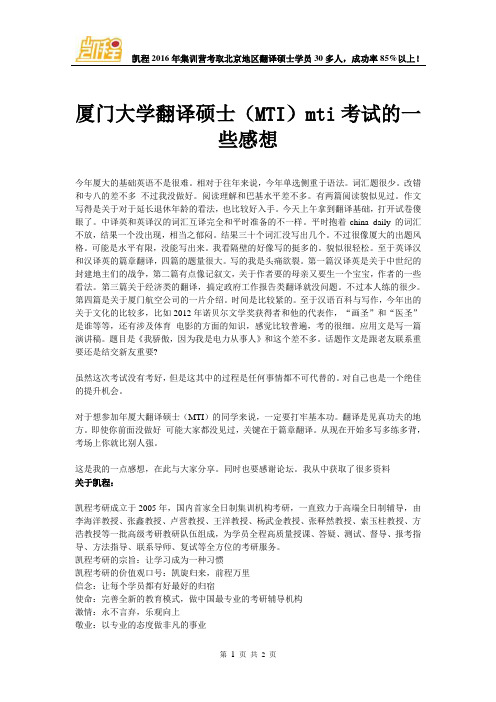
厦门大学翻译硕士(MTI)mti考试的一些感想今年厦大的基础英语不是很难。
相对于往年来说,今年单选侧重于语法。
词汇题很少。
改错和专八的差不多不过我没做好。
阅读理解和巴基水平差不多。
有两篇阅读貌似见过。
作文写得是关于对于延长退休年龄的看法,也比较好入手。
今天上午拿到翻译基础,打开试卷傻眼了。
中译英和英译汉的词汇互译完全和平时准备的不一样。
平时抱着china daily 的词汇不放,结果一个没出现,相当之郁闷。
结果三十个词汇没写出几个。
不过很像厦大的出题风格。
可能是水平有限,没能写出来。
我看隔壁的好像写的挺多的。
貌似很轻松。
至于英译汉和汉译英的篇章翻译,四篇的题量很大。
写的我是头痛欲裂。
第一篇汉译英是关于中世纪的封建地主们的战争,第二篇有点像记叙文,关于作者要的母亲又要生一个宝宝,作者的一些看法。
第三篇关于经济类的翻译,搞定政府工作报告类翻译就没问题。
不过本人练的很少。
第四篇是关于厦门航空公司的一片介绍。
时间是比较紧的。
至于汉语百科与写作,今年出的关于文化的比较多,比如2012年诺贝尔文学奖获得者和他的代表作,“画圣”和“医圣”是谁等等,还有涉及体育电影的方面的知识,感觉比较普遍,考的很细。
应用文是写一篇演讲稿。
题目是《我骄傲,因为我是电力从事人》和这个差不多。
话题作文是跟老友联系重要还是结交新友重要?虽然这次考试没有考好,但是这其中的过程是任何事情都不可代替的。
对自己也是一个绝佳的提升机会。
对于想参加年厦大翻译硕士(MTI)的同学来说,一定要打牢基本功。
翻译是见真功夫的地方。
即使你前面没做好可能大家都没见过,关键在于篇章翻译。
从现在开始多写多练多背,考场上你就比别人强。
这是我的一点感想,在此与大家分享。
同时也要感谢论坛。
我从中获取了很多资料关于凯程:凯程考研成立于2005年,国内首家全日制集训机构考研,一直致力于高端全日制辅导,由李海洋教授、张鑫教授、卢营教授、王洋教授、杨武金教授、张释然教授、索玉柱教授、方浩教授等一批高级考研教研队伍组成,为学员全程高质量授课、答疑、测试、督导、报考指导、方法指导、联系导师、复试等全方位的考研服务。
三跨生成功考入厦门大学,英语笔译MTI备考心得

研途宝考研/zykzl?fromcode=9820厦门大学英语笔译MTI学姐分享经验,一方面是对过去考研一年进行总结,另一方面,研途宝小编也是希望后来者可以有所借鉴,取得更加骄人的成绩。
行文大致包括初试方法、参考书籍、学习反思等。
成绩:2017年厦大英语笔译MTI初试381分,初复试均排名第十成功录取。
其中英语翻译基础129,百科126,翻译硕士英语67,政治59。
个人基本情况:某普通一本学校中文专业学生,中文基础扎实;通过三笔、大二获市级英语演讲比赛一等奖、六级540+、四级570+。
行文大致分为三部分,分别是初试、调剂、复试。
在第一部分初试上,我会简述一下我如何选学校,并对所有科目考试内容进行细化、列出所用书目,也将会按照时间顺序来叙述自己的准备过程,以及就2017年的初试考试内容给出自己的复习建议。
在第二部分,我会简单介绍一下自己为保险起见参加调剂的过程。
在第三部分复试,又分为笔试和面试。
为保险起见我也参加了华侨大学的复试,在这里也一并把经验分享给大家。
行文的最后,是亲身经历后的一些感悟。
一、初试研途宝考研/zykzl?fromcode=9820 2016年1月,上大三的我,正在青岛大学中文系交流。
系统旁听了一个学期的英语专业课程之后,我有了想要跨考翻译硕士的想法。
这些课程对我来说并不算难,甚至在一些大家都觉得枯燥的课程上,我找到了乐趣。
从大一开始我就每天坚持英语晨读,和小伙伴一起练习口语,也拿过学校、市级和省级的大小奖项。
可以说,英语是除了我的专业课学习之外,大学生活中最重要的部分。
但当时,我还是在喜欢的古代文学和相对陌生的翻译专业中摇摆不定。
为了更深入的了解翻译专业,我经常上知乎查一些关于翻译硕士职业发展、如何备考等问题,也搜集了许多网上的经验帖。
寒假每天练车,但除了整理经验帖,我也依旧每天都像从前一样抽时间背单词、模仿朗读新概念三、每周至少两次精读。
在择校上,我承认我有名校情结。
一个好的学校,带给你的不仅是知识的增长,更有开阔的眼界。
- 1、下载文档前请自行甄别文档内容的完整性,平台不提供额外的编辑、内容补充、找答案等附加服务。
- 2、"仅部分预览"的文档,不可在线预览部分如存在完整性等问题,可反馈申请退款(可完整预览的文档不适用该条件!)。
- 3、如文档侵犯您的权益,请联系客服反馈,我们会尽快为您处理(人工客服工作时间:9:00-18:30)。
Part 2: Grammar and Vocabulary.
01. Because noises modulate radiofrequency, radio stations use a band of frequencies to prevent
interference with other stations. 句义:噪音会干扰收音机频率,因此收音机电台用无线电波段来防止其他电台造成影
A. bone
骨头
B. solvent
溶剂
C. picture
照片
D. vestige
残余部分,遗迹,痕迹
03. When squashed the stem and leaves of the jewelweed exude a juice that will soothe some skin
更多资料下载: QQ: 1275181476 1398338755
供……的可选择的东西
D. a purpose for
目的是……
10. South Carolina’s mineral resources are abundant, but not at all of them can be lucratively
mined. 句义:南卡罗来纳州的矿产资源丰富,但不是所有地区的开采都有利可图。 答案:A 划线词义:获利多地,赚钱地 分析:
响。 答案:A 划线词义:(对波幅、频率的)调制,调谐 分析:
A. govern
调整,控制,操作
B. adapt
(使)适应,(使)适合
C. temper
使缓和,使温和
D. renovate
翻新,修复
02. A fossil is a remnant of a once-living organism. 句义:化石是曾经存在过的生物的残留物。 答案:D 划线词义:残余部份 分析:
咨询电话:4000719069
才思教育考研考博全心全意
A. an authentic
真正的,可信的
B. a muddled
混乱的,糊涂的
C. an instructive
有益的,供给知识的,教育的
D. an old-fashioned
老式的
08. The compact dictionaries published in recent years are not as unwieldy as some of the older
专心,专注
07. A fable is a didactic tale focused on a single character trail. 句义:寓言是围绕单一角色讲述的哲理故事。 答案:C 划线词义:教诲的,启发人的 分析:
更多资料下载: QQ: 1275181476 1398338755
A. immobile B. impermeable C. impressive D. imaginative
不活动的,静止的 不可渗透的,透不过的 印象深刻的 富于想像力的
06. Mergers may be effected to revive or rejuvenate failing businesses by the infusion of new
A. organic B. acidic
器官的;有机(体)的 酸的;刻薄的
C. exhausted
耗尽的
D. desirable
可取的,值得拥有的
15. Galena, the chief ore of lead, is a brittle mineral with a metallic luster. 句义:方铅矿是带有金属光泽的易碎矿物,它是铅笔芯的主要组成部分。 答案:C 划线词义:坚硬但易碎的,脆性的 分析:
majority. 句义:妨碍议事是一种议会战术,旨在拖延或阻止多数人通过议案。 答案:D 划线词义:方法;战术;手段 分析:
A. tradition B. rule C. observance D. maneuver
传统 规定 遵守,奉行 策略,谋略
05. Ocean waves can cut imposing cliffs along coastlines. 句义:海浪可以沿着海岸线切割出壮观的悬崖。 答案:C 划线词义:壮观的,令人印象深刻的 分析:
energy. 句义:生物学家发现特殊的细胞可以将化学能转化为机械能。 答案:A 划线词义:弄清,确定,发现 分析:
A. determined B. argued C. hypothesized D. griped
表扬
B. narrates
讲故事
ห้องสมุดไป่ตู้
C. exaggerates
夸张
D. classifies
分类
14. Fertilizer applied to soil can replace depleted nutrients. 句义:肥料可以替代土壤中耗尽的营养。 答案:C 划线词义:废弃的,耗尽的 分析:
sisters during the American Civil war, is largely autobiographical. 句义:路易莎·梅·奥尔科特的小说《小妇人》讲述了美国内战期间马奇家四姐妹的
经历,主要是一部自传。 答案:B 划线词义:详细叙述某事 分析:
A. praises
editions. 句义:比起老版的字典,近些年出版的简明字典轻巧多了。 答案:D 划线词义:不灵便的,笨重的 分析:
A. complete
完全的
B. tiresome
令人生厌的
C. reliable D. cumbersome
可靠的 大而笨重的;难以携带的
09. Author Katherine Sherwood McDowell had a knack for converting almost every experience
A. territorial
土地的,领地的
B. tree-dwelling
生活于树上的
C. consummate
完美的
D. grumpy
脾气坏的,性情暴躁的
13. Louisa May Alcott’s novel Little Women, which recounts the experiences of the four March
and tropical rain forests. 句义:夏威夷特有的鸟类,例如褐背孤鸫和白臀蜜鸟,栖息在火山和热带雨林地区。 答案:D
更多资料下载: QQ: 1275181476 1398338755
咨询电话:4000719069
才思教育考研考博全心全意
划线词义:某地特有的 分析:
A. hazel
淡褐色的
B. dense C. breakable
密集的;愚笨的 易碎的
D. sparking
打火花
16. In Hawaii, endemic birds, such as the omao and the apapane, dwell in the volcanic highlands
A. profitably
有利可图地,赢利地
B. safely
安全地
C. easily
简单地
D. extensively
广泛地,广大地
11. Ravaged by pollution and war, many famous monuments have become eroded and stained. 句义:经过战争和污染的摧残,许多著名的纪念碑都被侵蚀并褪色了。 答案:A 划线词义:褪色,变污 分析:
A. discolored
使变色,使褪色
B. dismembered
肢解
C. displaced
替换,取代
D. distinctive
有特色的,与众不同的
更多资料下载: QQ: 1275181476 1398338755
咨询电话:4000719069
才思教育考研考博全心全意
into marketable prose. 句义:作者凯瑟琳·舍伍德·麦克道尔拥有把自身所有经历改编成畅销散文的本领。 答案:A 划线词义:技能,本领 分析:
A. an aptitude for
有……的才能
B. an obsession with
痴迷……
C. an alternative to
咨询电话:4000719069
才思教育考研考博全心全意
irritations.
句义:将凤仙花的茎和叶压碎后,榨出的汁液可用于减轻皮肤刺痛。
答案:C
划线词义:压扁, 压烂
分析:
A. boiled
煮沸
B. aged
长大,变老
C. crushed
压碎,压坏
D. chopped
劈,切碎
04. The legislative filibuster is a parliamentary tactic designed to delay or prevent action by the
才思教育考研考博全心全意
厦门大学 2010 年 MTI 硕士入学考试
基础英语·答案详解
Part 1: Corrections.
Although cosmetic surgery (and non-surgically cosmetic procedures, such as Botox injections) sometimes produce negative outcomes—media often highlights surgery ‘disasters’—in the most part, the health risk for cosmetic procedures is low and patient satisfaction is high. Often, people who have been hobbled by poor body image all of their life, walk away from cosmetic surgery in confidence and the motivation to lead healthier lives. In addition, reconstructive surgery for burning and accident victims or to those disfigured from disease restore self-esteem and well-being in the way that other therapy cannot. In my professional opinion, it is a time for members of the medical community to examine the benefits and results of cosmetic surgery with prejudice and jealousy.
